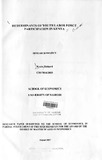| dc.contributor.author | Kyalo, Richard | |
| dc.date.accessioned | 2013-05-07T12:18:11Z | |
| dc.date.available | 2013-05-07T12:18:11Z | |
| dc.date.issued | 2005 | |
| dc.identifier.citation | Master of Arts in Economics | en |
| dc.identifier.uri | http://erepository.uonbi.ac.ke:8080/xmlui/handle/123456789/19842 | |
| dc.description.abstract | The Kenyan youth form the largest source of human resource, yet face numerous challenges
in their efforts to participate in the labor market. It is therefore essential to understand their
circumstances through comprehensive research so as to institute proactive strategies for
helping them. This study, whose objectives were to identify and analyze the factors that
influence youth labor force participation in Kenya, provides information on relevant factors
that a youth considers while making the choice. Secondary data from the ILFS 1998/99 were
utilized. Probit techniques were used to explain the determinants of youth labor force
participation. The results indicate that education and other socio-economic characteristics are
important determinants of youth labor force participation. The study recommends investment
in instruments to reduce family size and increase household income, government policies that
minimize favoritism towards men, supporting girl's education, reducing government
expenditure on higher education and supporting technical/vocational training. An economic
policy environment that is favorable for low skill labor-intensive techniques of production
(especially in the informal and agricultural sectors) would help absorb the new entrants into
the labor market, which would be favorable for the unemployed youth . | en |
| dc.description.sponsorship | University of Nairobi | en |
| dc.language.iso | en | en |
| dc.title | Determinants of youth labor force, participation in Kenya | en |
| dc.type | Thesis | en |
| local.publisher | School of Economics, University of Nairobi | en |

